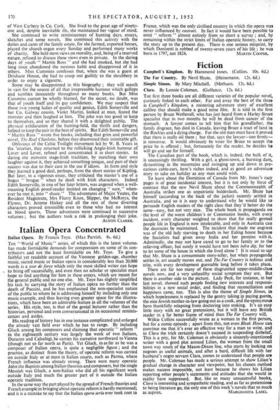Italian Opera Concentrated
Italian Opera. By Francis Toye. (Max Parrish. 8s. 6d.) THE " World of Music" series, of which this is the latest volume. has made formidable demands for compression on some of its con- tributors and not the least formidable on Mr. Toye. To give a faithful yet readable account of the Viennese golden-age, chamber music, sacred music or Italian opera in considerably less than 20,000 words is a tour de force which only the most skilled writer can hope to bring off successfully, and even then no scholar or specialist must hope to find anything for him in these essays, which are meant for the general public and no one else. Mr. Toye has slightly simplified his task by carrying the story of Italian opera no further than the death of Puccini, and he has emphasised the non-specialist nature of the public to whom he is addressing himself by including only one music example, and thus leaving even greater space for the illustra- tions, which have beeh an admirable feature in all the volumes of the series. His style, too, is that of the genial lecturer rather than the historian, personal and even conversational in its occasional reminis- cences and asides.
His reading of history has in one instance complicated and enlarged the already vast field over which he has to range. By including Gluck among his composers and claiming that operatic " reform " in the eighteenth century was largely the work of two Italians, Durazzo and Calzabigi, he carries his narrative northward to Vienna (though not so far north as Paris). Yet Gluck, in as far as he was a composer of Italian opera, is quite a negligible figure ; and the practice, as distinct from the theory, of operatic reform was carried on outside Italy or at most in Italian courts, such as Parma, where French influence was already strong. There were many operatic John the Baptists among Italian theorists and composers, but the single Messiah was Gluck, a non-Italian who did all his significant work outside Italy and much the greater part of it outside the Italian operatic tradition. In the same veay the part played by the spread of French theories and French example in bringing about operatic reform is hardly mentioned; and it is a mistake to say that the Italian opera seria ever took root in France, which was the only civilised country in which the opera was never influenced by castrati. In fact it would have been possible to omit " reform " almost entirely from so short a survey ; and, by remaining within the strict limits of Italian operatic history, to carry the story up to the present day. There is one serious misprint, by which Donizetti is robbed of twenty-seven years of his life ; he was


























 Previous page
Previous page